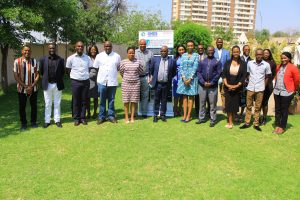 The African Union Commission’s Global Monitoring for Environment and Security (GMES) and Africa and SASSCAL has held a three day report back conference in Windhoek Namibia from the 14th to 16th of September 2021. The conference comes at a time when GMES and Africa, SASSCAL and its consortia conclude the first phase of the Wetlands Monitoring and Assessment Projects (WEMAST). This is a major milestone for GMES and Africa in its efforts to ensure Africa has enough capacity and resources to access and use Earth Observation (EO) technologies.
The African Union Commission’s Global Monitoring for Environment and Security (GMES) and Africa and SASSCAL has held a three day report back conference in Windhoek Namibia from the 14th to 16th of September 2021. The conference comes at a time when GMES and Africa, SASSCAL and its consortia conclude the first phase of the Wetlands Monitoring and Assessment Projects (WEMAST). This is a major milestone for GMES and Africa in its efforts to ensure Africa has enough capacity and resources to access and use Earth Observation (EO) technologies.
GMES and Africa is an Africa-wide programme, an initiative which is the manifestation of the longstanding cooperation between Africa and Europe. GMES’ aims to promote the development in Africa with focus on local capacities, provision of institutional, human and technical resources for access to and exploitation of EO-based services on operational basis for sustainable development. It was also designed to support the implementation of the African Space Policy and Strategy, on Earth Observation.
Moreover, GMES & Africa seeks to provide decision-makers with information and tools needed for the implementation of sustainable environmental policies at the continental, regional and national levels through their Regional Economic Communities and Implementation Centers (RICs) as well as maintaining, improving and sustaining access to EO data.
Meanwhile the WeMAST project was established to design, develop and operationalise an integrated Earth Observation based platform that can provide wetlands information services to target groups and end users. The target basins are the Cuvelai, Limpopo, Okavango and Zambezi, covering the following countries: Angola, Botswana, Namibia, South Africa, Zambia and Zimbabwe. The WeMAST project is also established to ensure human and institutional capacity development in accessing, processing and utilising products of this service, in line with the project concept called ‘with the Users for the Users’.
WeMAST is funded by GMES and Africa Support Programme which was formed through a collaboration between the Africa Union and the European Union in the area of space science & technology.
The Project is also being managed and implemented by a consortium of institutions led by the Southern African Science Service Centre for Climate Change and Adaptive Land Management (SASSCAL). Among these institutions is the University of Botswana, University of Zambia, Cape Peninsula University of Technology, University of the Western Cape and Midlands State University, the South African National Space Agency (SANSA) and the National Remote Sensing Centre (NRSC) of Zambia.
Reflecting on the progress made during the first phase of the WeMAST Project, the African Union Commission’s Ag. Head of Science and Technology Division, Mr. Hambani Masheleni applauded the progress and the immense work and infrastructure that the project has manage to establish and implement. He pointed out the significance of unity of purpose exhibited by the consortium in ensuring the fruitful outcomes of the WeMAST project. He further added that the ability to collaborate and work together as the diverse African institutions will promote knowledge sharing, innovation as well as yield a significant impact for positive change in Africa and the globe. Mr Masheleni emphasised that this knowledge creation is an important output that will produce future scientists into the region.
Presenting on the exclusive achievements the WeMAST Project has made, the Executive Director of SASSCAL, Dr. Jane Olwoch says SASSCAL has done tremendous work in the construction of Earth Observation Systems infrastructure which encompasses both cloud and physical infrastructure.
According to Dr. Olwoch the WeMAST’s objective is to support basin authorities and practitioners from various sectors in Southern Africa by creating access to data in relation to wetlands conditions across Southern Africa. Some of the users that will benefit the most from this project infrastructure mentioned are the river basin commissioners, water authorities, conservation authorities, government departments, research and academic institutions, as well as the local communities.
Besides creating awareness and advocacy, Dr. Olwoch also says that the WeMAST Project has gone to as far as creating capacity development and training programmes to ensure advancement of the programme impact. Moreover the project has since supported academic studies and research work at Masters Level and PhD Level through funding and scholarships. Dr. Olwoch commended GMES and Africa’s efforts which have demonstrated that though African countries are divided by their borders, earth observation knows no boundaries.
So far, 13 projects under a consortia of 13 institutions across Africa have received funding from GMES and AFRICA and are under implementation with focus on two service components namely Natural and Water Resources Service and Marine and Coastal Service. More information on GMES & Africa and SASSCAL activities can be found on the SASSCAL website, www.sasscal.org




